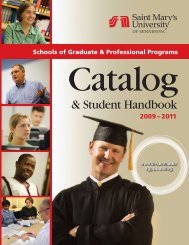PDF version - Saint Mary's University of Minnesota
PDF version - Saint Mary's University of Minnesota
PDF version - Saint Mary's University of Minnesota
Create successful ePaper yourself
Turn your PDF publications into a flip-book with our unique Google optimized e-Paper software.
Academic Resources<br />
students in developing a general perspective <strong>of</strong> life/work planning, as well as evaluating and effectively<br />
implementing specific job search strategies.<br />
Some <strong>of</strong> the many services and resources available through career services are:<br />
• Self-assessment tools to assist with choosing a major and developing career plans<br />
• Information on majors and careers<br />
• Resume, cover letter, and interviewing workshops and informational handouts<br />
• Career and job fairs<br />
• Career Exploration class (PD101)<br />
• Job Search Strategies class (PD201)<br />
• Opportunities to meet and network with SMU alumni<br />
• Career development events<br />
• Listings <strong>of</strong> full-time and part-time job openings<br />
• Graduate school and pr<strong>of</strong>essional school information<br />
• Individual appointments<br />
Students are encouraged to visit career services staff early in their college career to develop the most<br />
effective career path. Questions regarding career services should be directed to the director <strong>of</strong> career services.<br />
Disability Services and Academic Support Policy for Students<br />
It is the policy <strong>of</strong> the university to comply with applicable federal, state, and local laws concerning<br />
access to education benefits and programs.<br />
Academic support services are available at the Winona campus to eligible students with disabilities<br />
through the academic skills center (ASC). For purposes <strong>of</strong> this policy, “disabled student” is defined to<br />
include a student who has a physical or mental impairment which substantially limits him or her in one<br />
or more major life activities, or has a record <strong>of</strong> such an impairment, or is regarded as having such an<br />
impairment.<br />
A student with a disability who requests academic support services must provide documentation <strong>of</strong> the<br />
disability and the need for the services requested to the disability services coordinator (DSC). Typically,<br />
that documentation will be in the form <strong>of</strong> a diagnostic report. The diagnostic report is used for two<br />
purposes: to document the existence, nature, and extent <strong>of</strong> the disability and to identify reasonable<br />
accommodations. Since the provision <strong>of</strong> reasonable accommodations and services is based on the<br />
impact <strong>of</strong> the student’s disability on his/her current academic performance in a specific academic<br />
program, the student’s best interests are served by providing recent and appropriate documentation <strong>of</strong><br />
his/her disability. Usually, testing that has been conducted within the last three years will be considered<br />
recent and appropriate documentation. The exception to this would be psychological disabilities which<br />
require documentation within one year to be considered current. Assessments made at the pre-college<br />
level will qualify as appropriate documentation only if they reflect adult capabilities and the academic<br />
demands <strong>of</strong> higher education. If a diagnostic report is inadequate to determine the present extent <strong>of</strong> a<br />
student’s disability or appropriate accommodations, the DSC may require a supplemental assessment <strong>of</strong><br />
the disability at the student’s expense.<br />
The disability services coordinator in consultation with appropriate staff, as necessary, will determine if a<br />
student qualifies for academic accommodations. The disability services coordinator in consultation with<br />
appropriate faculty members, as necessary, will determine the specific academic accommodations to be<br />
provided to an eligible student, taking into account the student’s stated preferences, if any.<br />
40
















